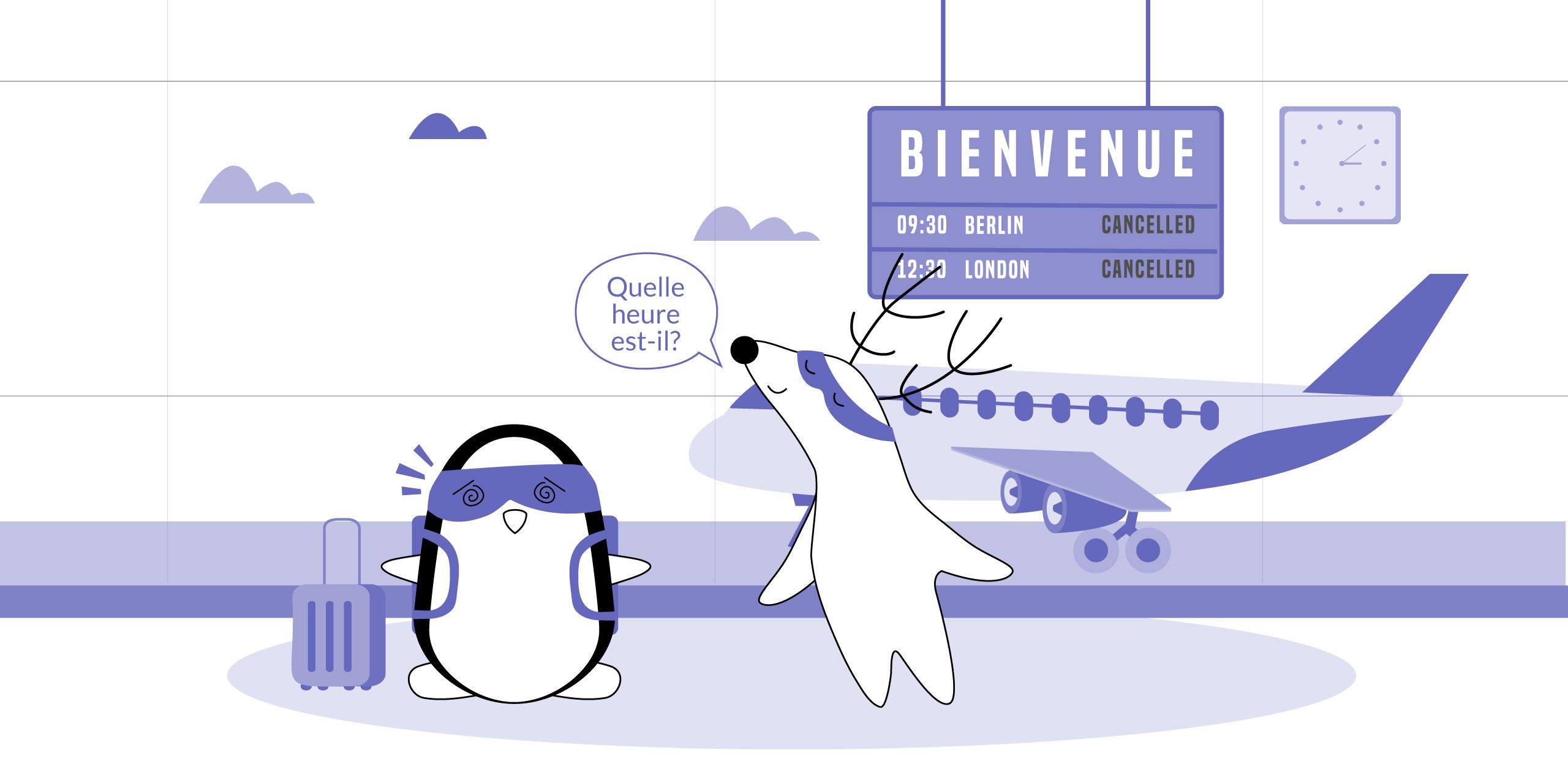When you think of the French language, what comes to mind? Romance? Elegance? Sophistication?
Well, forget all that. The French language is also hilarious – Yes, hilariously funny! Why do we say this? Because the French have some words and phrases that just don’t make sense when translated into English, and they sound downright silly when pronounced correctly. Moreover, there are so many of them that we already have another article on this topic!
Now, the time has come to broaden it a bit. So, without further ado, let’s get to the good stuff: the 14 funniest words and phrases in French. Put on your beret, and get ready for a linguistic adventure!
Avoir des oursins dans les poches
The funny French phrase Avoir des oursins dans les poches literally means "to have sea urchins in your pockets." This can look confusing at first sight, so what does it really mean?
As it turns out, the phrase originated in the early 1900s and was used to describe someone who was stingy or miserly. The idea refers to sea urchins’ spikes, literally saying that it hurts for the stingy person to get money out of their pocket.
Today, the phrase is commonly used to describe anyone who is tightfisted or cheap. For example, you might say:
Native
Translation
Jean est un tel radin. Il a des oursins dans ses poches.
Jean is such a tightwad. He's got sea urchins in his pockets.
Grognon/grognonne
The French word grognon (grogonne in the feminine form) is translated to "grumpy." It sounds just as silly as the English translation – just imagine saying this to someone in the morning:
Native
Translation
Tu es grognon ce matin !
You are grumpy this morning!
For us, this sounds instantly funny, and it immediately brings a picture of the dwarf from Snow White saying something in his grumpy voice, but with an amusing French accent. Or maybe Medusa the Gorgon standing right in front of us! Choose your association.
The word doesn’t have an interesting origin, though, as it might seem – it’s simply derived from the French verb grogner (to grunt).
Ducon
This word is the French version of "jerk" or "asshole,” but with a funny nuance. “Con” (or “conne” in the feminine form) is a common derivative and a pretty strong French curse word. But, adding the prefix “du-” to it makes it immediately sound like a royal title. So the literal translation for this funny insult would be “royal asshole.”
Ducon is both insulting and clever at the same time, and while we advise to not use it often, we do acknowledge that the person who came up with it was pretty smart.
Native
Translation
Je n'aime pas Jerry, c'est juste un ducon !
That guy is a real jerk!
Note here that while the feminine version of this word exists (duconne), the masculine version is used most often for all genders.
Tomber dans les pommes
This funny French expression is literally translated as "to fall into the apples,” but it really just means “to faint.” Now, imagine if every time someone lost consciousness, they fell into a pile of apples?
Not the most pleasant fall, in our opinion. But, for some reason, long ago, some French speaker decided that this phrase describes fainting in the most down-to-earth way – and the phrase stayed in the language.
Today, you might use it to tell what happened to your grandmother when she saw a rat in her kitchen:
Native
Translation
Quand elle a vu le rat, elle est tombée dans les pommes.
When she saw the rat, she fainted.
Avoir la banane
Now, this is our favorite of the funny French phrases, just because of the silly connotation it has. Avoir la banane literally means "to have a banana," but it is simply used to describe someone who is… smiling.
Why? That’s because of the shape of the smile – it looks like a banana! We wonder which French person came up with this idiom, and not, let’s say, a half-moon? This proves once again that the French are not just romantic – they are creative as hell.
Native
Translation
Tu as l'air content ! Tu as la banane !
You look happy! You're smiling!
Ce n’est pas tes oignons.
Yes, we’re writing this with a dot. It’s to express the straightforwardness of the message. This one is a pretty rude French phrase, which literally means “it’s not your onions” – but sometimes, it’s just so necessary. As you might have guessed, it simply means “it’s none of your business,” just with a French food-loving hint.
This phrase is often used to tell people to stop asking too many questions about something that doesn't concern them.
Native
Translation
Arrête de poser des questions sur notre mariage... ce ne sont pas tes oignons.
Stop asking about our wedding – it's none of your business.
Chapeau !
This is just another example of funny French words that are not amusing because of how they sound but because of how they are used.
Now, where would you say the word “hat?” In the clothing store, right? Well, many French speakers often use it to say "Good job!", "Bravo!", or “Congratulations!” Just imagine coming up home with an A+ mark on your exam sheet, and your dad says “hat!” Personally, it would leave us with mixed feelings.
There’s no strange story behind that, though – this funny French slang simply refers to the act of someone tipping their cap to you.
Native
Translation
Chapeau, Marie ! C'est magnifique !
Good job, Mary! This is beautiful!
Pisser dans un violon
Now, isn't this phrase just amazing to you? Literally translated, it describes someone who is trying to do something useless, like pissing into a violin. We're not sure how this one came about, but we bet that it was created by someone with a very vivid imagination.
This phrase is often used to describe people who are overreaching, just too confident in their abilities, or are just trying to do something hopeless.
Native
Translation
Tu veux lui donner de la crypto comme cadeau ? Ce n'est pas un peu... pisser dans un violon ?
You want to give him crypto as a gift? Isn't it a bit... useless?
La barbe à papa
This is a very amusing word for "cotton candy" in French, and it literally means "dad's beard." We're not sure if this is because dads get a sweet beard when eating it or just because they already have beards that resemble cotton candy. Maybe both?
In any case, we think that this is a very creative and funny way to describe this type of sweet treat!
Native
Translation
J'adore la barbe à papa !
I love cotton candy!
Ça ne casse pas trois pattes à un canard
This is one of the most popular and funny French idioms, which literally means "it doesn't break three legs of a duck." In other words, it's not a big deal – “nothing to write home about,” as we’d say in English.
This phrase is often used to describe something that is very easy to do or that doesn't require any special effort. For example, if you’ve just found out your friend broke up with her toxic boyfriend, you might have this kind of a conversation:
Native
Translation
Vous avez rompu avec Stan récemment ? Pourquoi tu n'as rien dit ? – Ah, ça ne casse pas trois pattes à un canard.
You broke with Stan recently? Why didn't you say anything? – Ah, it's nothing to write home about.
Pédaler dans la semoule
This is one of the funniest French idioms, which literally means "to pedal in semolina" (semolina is a type of very fine wheat flour). In other words, it means to struggle or to go around in circles. In our opinion, though, the English equivalent of this phrase is less descriptive when it comes to showing the effort a person makes to get out of a tough situation.
French learners might experience pédaler dans la semoule when trying to move to higher levels of language knowledge and getting stuck.
Native
Translation
Je suis bloqué au niveau B1 depuis des années mais je ne peux pas aller plus haut ! J'ai l'impression de pédaler dans la semoule.
I've been stuck of B1 level for years but can't move higher! It feels like I'm pedaling through semolina.
En faire tout un fromage
This is one of the most peculiar French sayings, which literally means "to make a cheese out of it." In other words, it means to make a big deal out of something that is actually not that important. In English, we’d say that someone makes something out of nothing, or, in a more expressive way, “makes mountains out of molehills.”
French people use this phrase in many different situations. You can say it, for example, when your friend is overreacting about getting a C on their math test.
Native
Translation
Arrête de faire tout un fromage ! Ce n'est qu'un C, ce n'est pas la fin du monde.
Stop making such a big deal about it! It's just a C, it's not the end of the world.
It’s also one of the many cheese idioms that French has – for example, have you heard about the phrase “three cheeses high?”
Devenir chêvre
This phrase literally means "to become a goat," but it actually has nothing to do with animals. In fact, it’s used to describe someone who has been driven mad by something. In English, a similar phrase would be “to go nuts.”
For example, imagine talking to a French person who’s speaking very quickly and with a strong accent – and your listening skills just don’t allow you to understand what they’re saying. Moreover, you need to go to the bathroom, and they can’t seem to explain where it is in a simple way! Anyone would go crazy in such a situation.
Native
Translation
...il était en train de parler de quelque chose, et je voulais juste aller aux toilettes. Et je suis devenue chèvre et j'ai commencé à lui crier dessus...
...he was going on and on about something, and I just wanted to go to the bathroom. And I just became a goat and started shouting at him…
Être au taquet
This is one of the most useful French idioms, which generally means to be at the limit, to be at the maximum of your possibilities, or even to do your best. You can use it when you’re trying your hardest or making an effort to achieve something.
Native
Translation
Je vais au taquet pour réviser pour mon examen.
I'm going flat out to study for my exam.
The literal translation of this phrase refers to the piece of wood put between a door and a wall to block it (to be a wedge). It basically means that someone is working very hard with the expectation that something good will happen.
Explore the World of Fun French Words
The French language is a trove of idiomatic expressions that can make your learning experience much more engaging. Knowing them won’t only allow you to understand native speakers better, but you'll also communicate with them in a more nuanced way.
Moreover, it’s important to remember that language spreads much further than simple, basic vocabulary and being able to express your needs is just a start. If you want to really become fluent in French, it’s especially important to learn how to use idioms and slang in everyday conversations.
Funny words in French are not just funny words – if you can use them properly, they are proof that you are moving higher on the level ladder and really making the French language your own.









